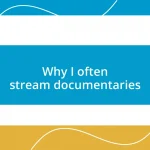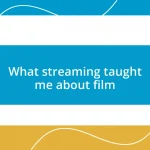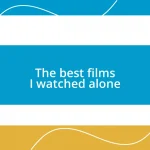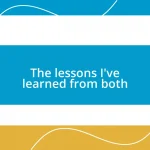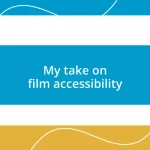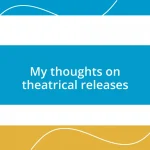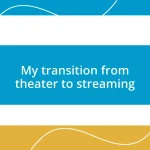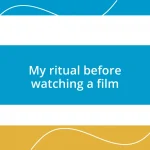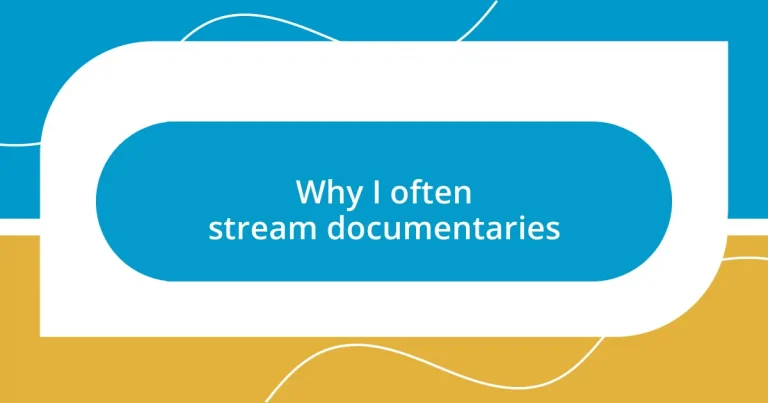Key takeaways:
- Documentaries engage viewers by presenting emotional narratives that challenge perspectives, educate on complex topics, and inspire reflection and action.
- Streaming documentaries offers benefits like access to diverse viewpoints, convenience for reflection, and opportunities for community discussions that enhance understanding.
- Finding credible documentaries involves selecting reputable sources, cross-referencing expert opinions, and engaging with documentary communities for recommendations and deeper insights.
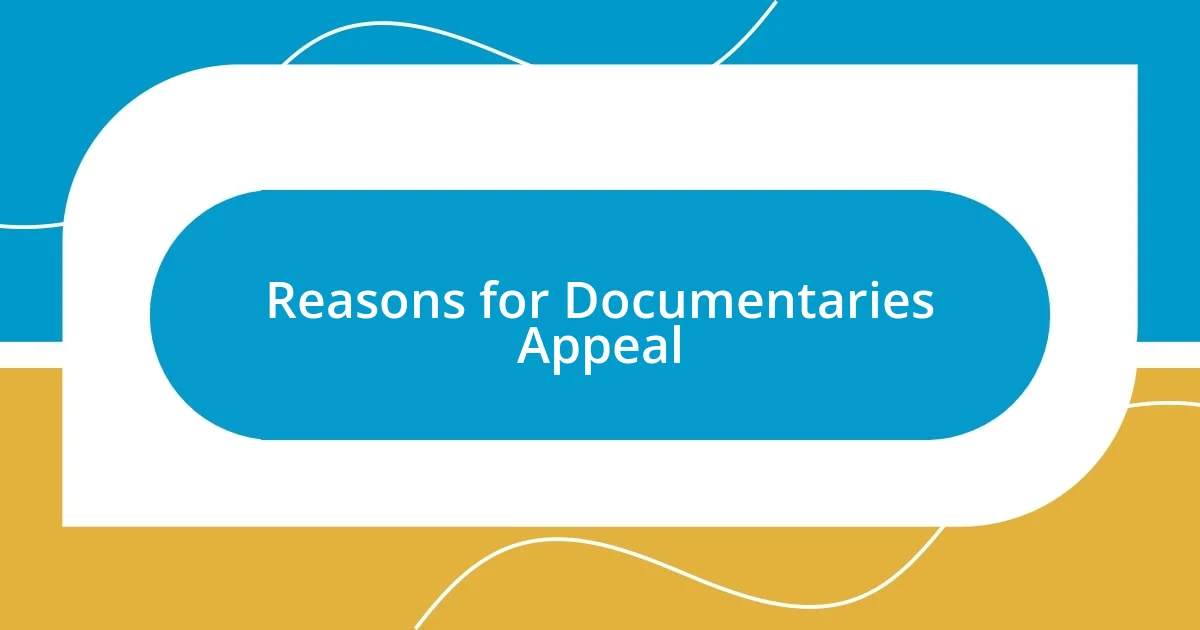
Reasons for Documentaries Appeal
One reason documentaries have such a strong appeal is their ability to shed light on realities we might not encounter in our daily lives. I remember watching a documentary series about climate change that left me in awe, showcasing both the beauty of nature and the alarming threats it faces. Have you ever felt that gut punch of realization when you witness something so profound? It’s eye-opening.
Another compelling aspect is the emotional connection they often forge with viewers. When I watched a documentary about individuals overcoming disabilities, I found myself tearing up—not just for their struggles but also for their triumphs. It’s incredible how a well-crafted narrative can resonate on such a personal level, making us reflect on our own lives and challenges. Isn’t it amazing how facts presented with raw emotion can inspire us?
Lastly, I find that documentaries often challenge our perspectives and beliefs. After watching one that tackled social justice issues, I was left questioning my own preconceptions. Here’s a thought: how often do we allow ourselves to be uncomfortable in order to grow? Engaging with these films not only educates but also encourages us to think critically about the world around us.
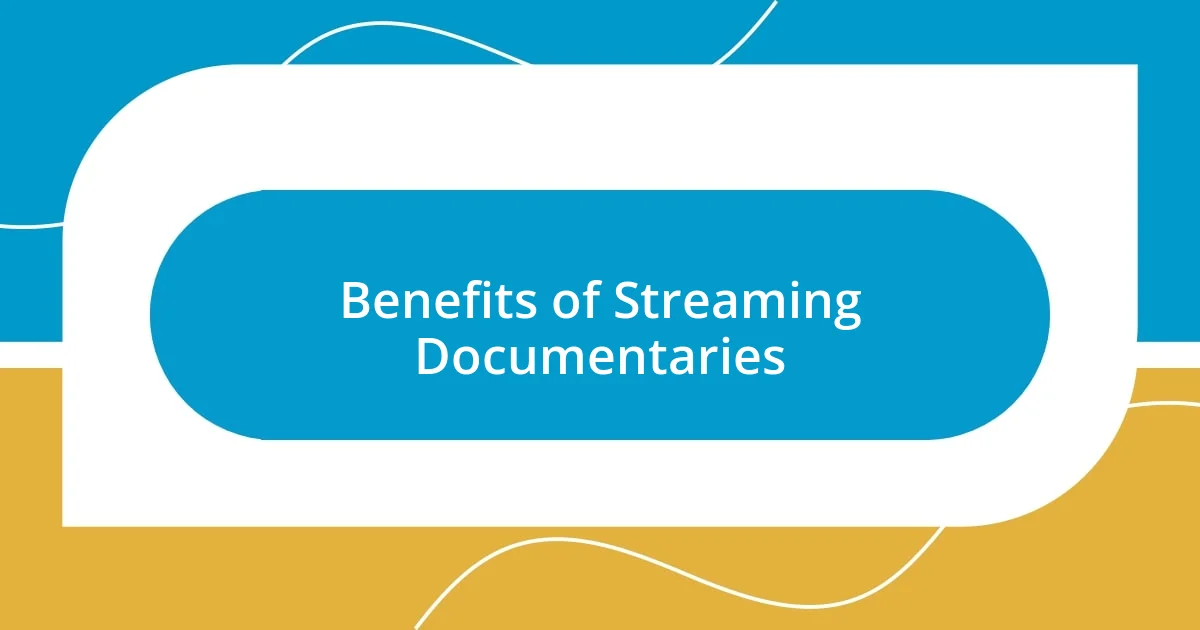
Benefits of Streaming Documentaries
Streaming documentaries provides a unique opportunity to gain knowledge and broaden our understanding of various issues. Personally, I remember diving into a documentary on food sustainability, which completely shifted my perspective on what I put on my plate. It’s fascinating how immersing ourselves in these narratives can unravel complex topics, allowing us to grasp the nuances we might otherwise overlook. You’ll often find yourself thinking, “Wow, I never considered that!”
Here are some specific benefits of streaming documentaries:
- Access to Diverse Perspectives: Streaming platforms offer an array of documentaries from around the world, presenting varied cultural views and personal stories that expand our horizons.
- Convenience and Flexibility: Watching documentaries at your own pace means you can pause, reflect, and even revisit important sections, enriching the learning process.
- Community Engagement: Many documentaries inspire discussions among viewers, turning newfound knowledge into meaningful conversations with friends or family, thereby deepening the impact of the content.
- Visual Learning: The use of powerful imagery and storytelling makes complex subjects more relatable and easier to digest, often leading to a greater emotional resonance.
- Inspiration for Change: Documentaries can serve as a catalyst for personal and social change, igniting passion and inspiring viewers to take action in their own lives.
The way documentaries weave facts with heart tends to linger, nudging us toward deeper reflections on our choices and actions. I still find myself thinking about the lessons learned from one particular film about the ocean’s ecosystems, feeling a sense of responsibility to help protect them. Such insights can genuinely transform how we view our role in the world.
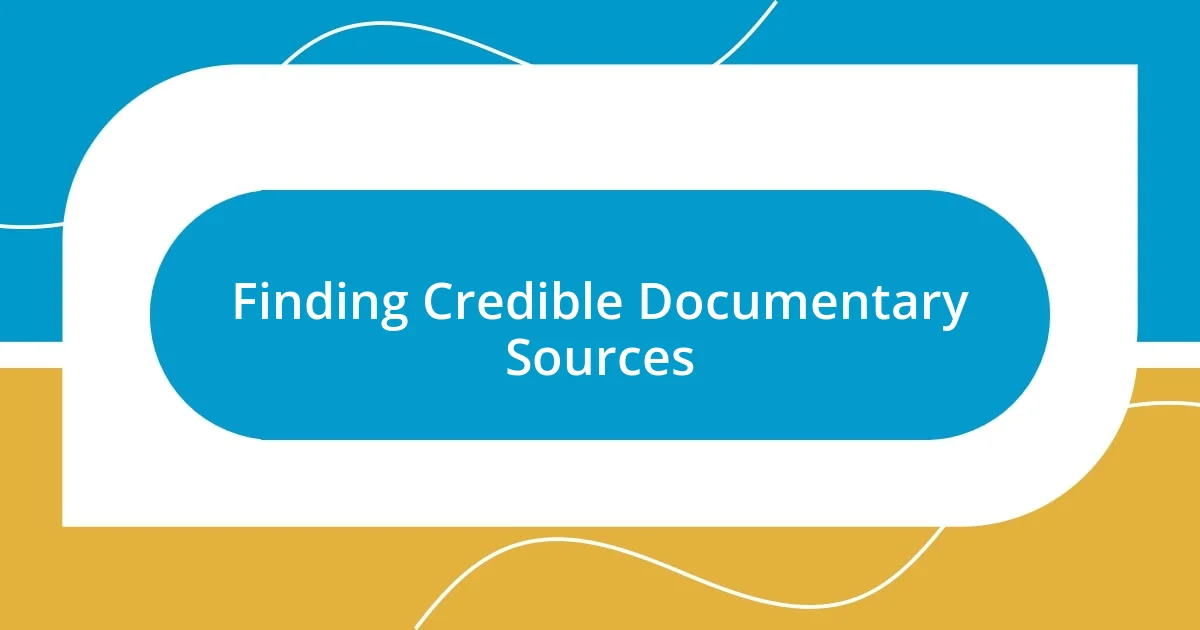
Finding Credible Documentary Sources
Finding credible documentary sources can sometimes feel like searching for a needle in a haystack. I recall once getting drawn into a series that promised to reveal the truths behind a global crisis. However, I soon realized the site sourcing it lacked verified credentials. Choosing documentaries from reputable platforms with fact-checking systems makes a big difference; it not only ensures accuracy but also enhances our viewing experience.
Another aspect worth considering is cross-referencing. I always appreciate when a documentary elegantly ties information from various expert sources. For instance, I watched a film that included insights from scientists, activists, and people impacted by issues. Having these diverse viewpoints helped me to form a more nuanced understanding of the topic, reminding me how critical it is to seek comprehensive representations rather than surface-level interpretations.
Lastly, seeking out documentaries made by established filmmakers or those recognized by awards can be a good indicator of reliability. I’m often drawn to documentaries that have received accolades, as they usually undergo rigorous scrutiny before their release. They not only educate but also inspire trust, making me feel secure in the knowledge presented. This trust fuels my desire to explore the themes further, often leading me down personal rabbit holes of exploration.
| Source Type | Example |
|---|---|
| Academic Institutions | Documentaries produced by universities often have rigorous research backing them. |
| Film Festivals | Films showcased at reputable festivals generally indicate quality and credibility. |
| Established Production Companies | Reputable companies like PBS or National Geographic have a history of producing insightful content. |
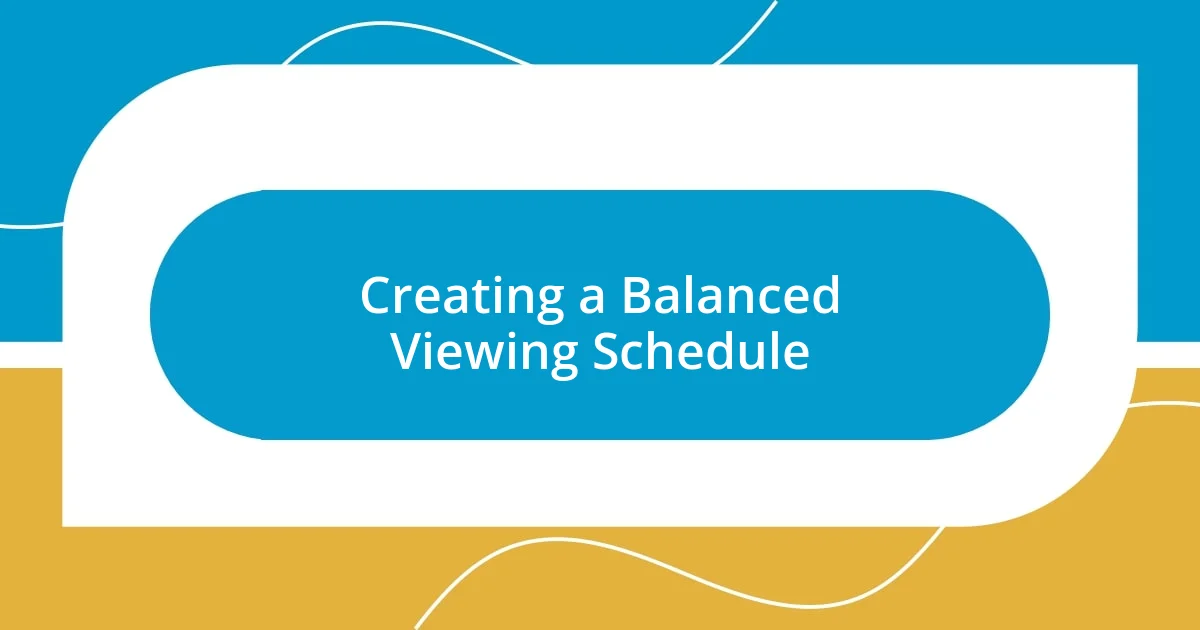
Creating a Balanced Viewing Schedule
Finding the right balance in my viewing schedule can turn my documentary-watching experience into something truly enriching. I make it a point to alternate between heavier topics and lighter, more uplifting narratives. For instance, after watching a deeply moving film about climate change, I might follow it up with a quirky series on cultural traditions around the world. This mixing not only helps me absorb serious messages without feeling overwhelmed but also keeps my viewing fresh and engaging.
Moreover, I’ve learned to set time limits to create a balanced routine. When I first got hooked on documentaries, I would easily binge-watch for hours, which left me feeling drained. Now, I consciously allocate specific days for documentary viewing, allowing those insights to marinate in my mind. I often ask myself, “How can I fit this into my week without overwhelming my other interests?” This reflection leads me to create a schedule that nurtures my love for learning while ensuring I make time for other activities that rejuvenate me.
It’s also crucial to reflect on what I want to take away from each viewing session. I recall a time when I watched an intense documentary on social justice, and it sparked my desire to engage in local community service right afterward. By considering my goals for each documentary, I can adjust my viewing choices. How can this film impact my thoughts or actions? This approach keeps my viewing not just informative but transformative, helping me maintain a vibrant and holistic viewing schedule that continually enriches my life.
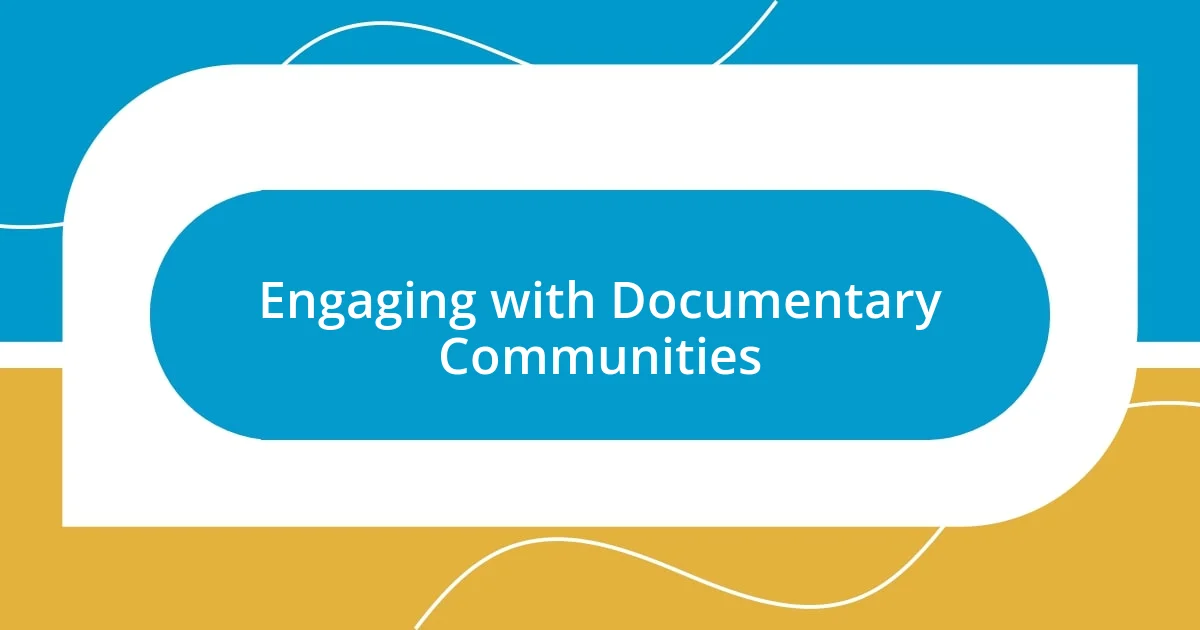
Engaging with Documentary Communities
Engaging with documentary communities has opened up a whole new dimension of my viewing experience. I often find myself participating in online forums where enthusiasts gather to discuss recent films. It’s fascinating to share perspectives with others who appreciate the nuances that documentaries portray. I remember joining a discussion about a revealing documentary on food sustainability, where someone highlighted a detail I had overlooked. Suddenly, it felt like I wasn’t just a passive viewer—I was part of a vibrant conversation.
One of the most enriching aspects of these communities is the diversity of opinions they bring to the table. Engaging with a community means encountering different interpretations of the same documentary. I once watched a powerful film that sparked heated debates within a group I’m part of. The differing viewpoints led me to reconsider my own stance and do further research, expanding my understanding of the topic. Isn’t it incredible how sharing our thoughts can deepen our appreciation and elevate our knowledge?
Moreover, I’ve learned the value of recommendations from fellow documentary lovers. When someone I trust suggests a hidden gem, I feel excited to dive in. Just last month, I was recommended a lesser-known documentary about indigenous cultures that completely shifted my worldview. Engaging in these communities cultivates a sense of belonging and fuels my curiosity, making me eager to explore even more. There’s something special about knowing I’m not alone on this journey of discovery and insight.
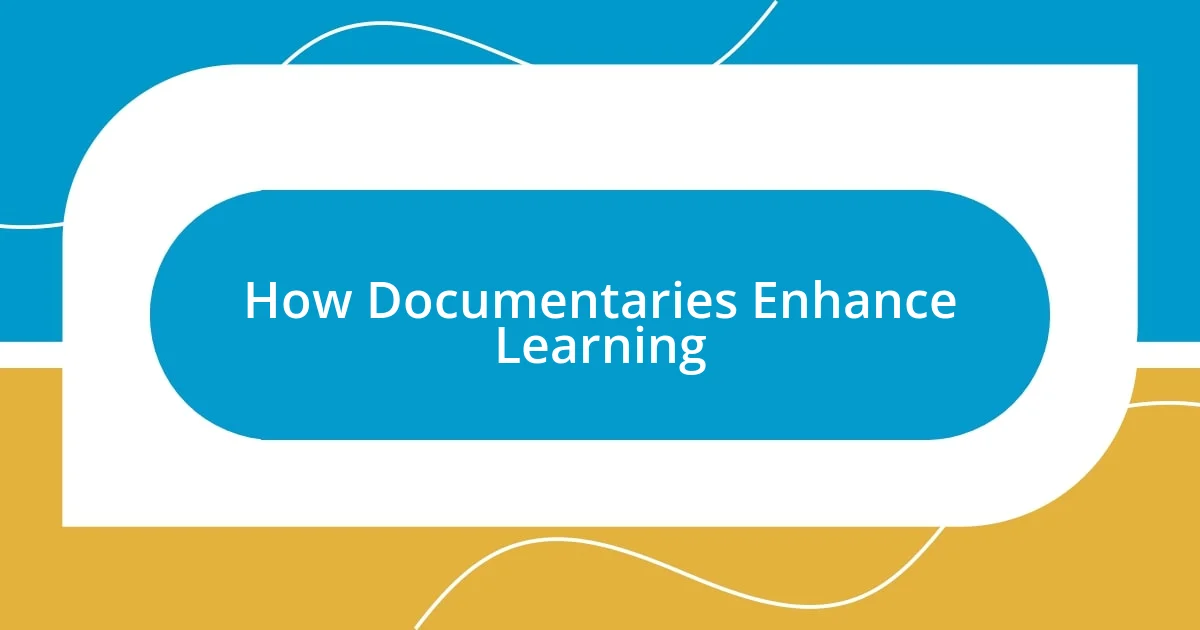
How Documentaries Enhance Learning
Documentaries serve as powerful tools for enhancing learning because they bring complex subjects to life. I remember watching a documentary about the intricacies of human psychology, and it illuminated concepts I had only skimmed over in textbooks. When a film can visualize these ideas in action, it makes the learning experience more relatable and memorable. Have you ever felt a concept click into place just because you saw it portrayed visually? It’s like that “aha!” moment when a light bulb goes on in your mind.
The emotional engagement that documentaries offer also plays a crucial role in deepening understanding. For example, after viewing a poignant film on refugee crises, I felt compelled to research the historical context behind it. This emotional connection turned a passive viewing experience into an active quest for knowledge. Isn’t it remarkable how an evocative story can motivate us to explore further? Documentaries invite us to form emotional bonds with the subject matter, fostering a genuine desire to learn more.
Moreover, documentaries often present real-life experiences that resonate on a personal level. When I watched one about climate activists, I found myself reflecting on my own environmental habits. This self-examination pushed me toward action, like reducing plastic use in my daily life. Reflecting on how a film’s narrative impacts our choices can transform learning into personal growth. Can you recall a time when a documentary led you to change a habit or consider a different perspective? Those moments highlight the profound educational potential embedded within the format.
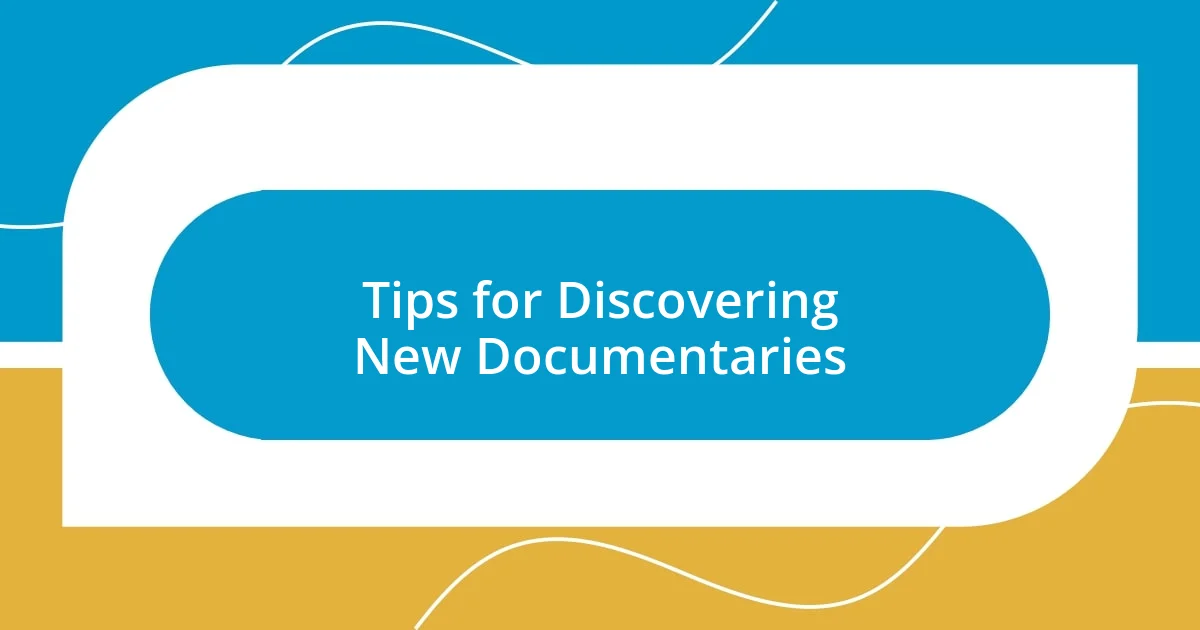
Tips for Discovering New Documentaries
Discovering new documentaries can sometimes feel overwhelming, but I’ve found that exploring curated lists online can be incredibly useful. I typically start with platforms like IMDb or Letterboxd, where users often highlight hidden treasures. Just the other week, I stumbled upon a documentary about urban gardening that wasn’t on my radar, and it ended up being a delightful surprise. Have you ever had that moment where a random suggestion completely shifts your viewing agenda?
Another tip is to leverage social media for recommendations. I often scroll through Twitter or Instagram, searching for hashtags like #DocumentaryFilm or #MustWatchDocs. This is where I can catch glimpses of what friends and influencers are enjoying. For example, I once discovered a gripping documentary on ocean conservation through an influential environmentalist’s post, which completely changed my perspective on marine life. Isn’t it fascinating how a simple scroll can lead to such enlightening finds?
Lastly, don’t underestimate the power of film festivals, both in-person and virtual. I attended a documentary festival last year, and it introduced me to filmmakers and stories I would never have encountered otherwise. Engaging with the creators in Q&A sessions deepened my appreciation for their craft. Have you ever had the chance to connect with a director or filmmaker? That experience made me feel like I was part of something greater, and it encouraged me to seek out more documentaries from up-and-coming talents. This approach has opened up a treasure trove of new viewing options that I now cherish.
